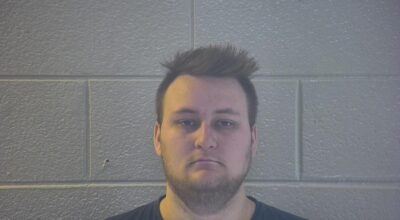Citizens and officials discuss use of opioid settlement funds
Published 5:06 pm Friday, March 24, 2023

- County Attorney Daryl Day speaks about ideas for opioid settlement funds Monday. Photo by Lance Gaither.
|
Getting your Trinity Audio player ready...
|
The Lincoln County Fiscal Court and County Attorney Daryl Day held a public forum on Monday to hear ideas for uses of the funds provided from the state’s settlement with opioid manufacturer Johnson and Johnson and three opioid distributors, AmerisourceBergen, Cardinal Health, and McKesson.
Although the exact amount of funds that Lincoln County will receive has not been announced, Day estimates the county will receive between roughly $1 million and $1.5 million paid out over the course of 15 years. So far the county has received $189,834.
“I want to make sure we have all the information we can get on what people think will work,” Day said. “We want to come up with ideas now and we want to be fluid so we don’t commit all the money until it is all gone. My fear is when 2030 or 2040 comes we look back and realize we spent the money wrong and still have an opioid problem.”
Isaiah House Director of Community Engagement and Lincoln County Agency for Substance Abuse Policy Grant Coordinator Ashley Lopez explained that Lincoln County does not have a strong support network for recovering addicts after they have left treatment, and that the money could be used to create a network.
“I am a recovering addict from Lincoln County, I’m from here, my kids go to these schools,” Lopez said. “Treatment centers already get plenty of money from Medicaid. It is things like recovery housing, sober living. Right now if you complete treatment and come back to Lincoln to recover, there is nobody here who will rent to you. There is nobody who is going to do second chance hiring. There are no self-help, AA, or NA meetings. Lincoln County isn’t a place you can come to and thrive in recovery. Those are the things we need.”
Lopez explained that many times, recovering addicts need to attend self help meetings as a requirement for probation and that many of them do not have access to transportation for meetings in Danville or Lexington. She would like to see a recovery hub built that would have daily meetings and professionals on staff to provide aid to those struggling in their recovery.
Other ideas for the funds were providing Narcan and training in schools, churches, and to first responders throughout the county, education on the dangers of opioids, and providing transportation to treatment centers and support meetings.
Stanford Mayor Dalton Miller stressed the importance of supporting the children of recovering addicts.
“We have to figure out a way to help these kids,” Miller said. “We need to be there to help these kids and help them continue to have a relationship with their parents while they are in treatment. It is better to help those kids today than in 14 years when they are an adult who’s addicted because it’s all they ever knew, and they ever saw their parents when they were clean and in treatment. If we don’t focus on the kids, the problem will continue to grow. I was one of the people who didn’t care if addicts lived or died at one point. I asked myself, ‘what if it was my kid struggling? That makes the difference. I had to help a little boy write his mother’s obituary. Six days before I told his mom she was going to die if she didn’t get treatment. That sucks.”
Miller explained that Stanford has acquired a mobile drug pick up and incineration trailer that will be offering its services throughout the county.
Day believes that providing activities and outreach programs are a key aspect of helping prevent children from becoming addicts in the future. He is open to using a portion of the money to create income based financial assistance for little league sports.
“Having things for kids to so they don’t have a reason to try drugs,” Day said. “We aren’t going to keep all of them off of it; if 10 or 20 percent don’t, that is a large number of kids that we have changed the direction of. Part of it is that in the past we have brought in larger than life figures for anti-drug messaging that kids can’t relate to. Kids aren’t going to care what an attorney has to say, they identify with farmers, someone who drives a truck for a living. They need to hear from people like them.”
Local resident and registered nurse Linda Edwards explained her son has struggled with addiction and has been missing for over a year. She said that drug addiction can affect any family regardless of income or background.
“Look at my cousin’s child,” Edwards said, “She overdosed on meth, she bought an Adderral because she was studying for a test. She was studying to be a neurologist. Before she could get to the ER she was dead. I have seen people on Flakka squealing like a pig, you don’t understand what these families are going through until you see it. I would like to see support and education out there. We need tools to help these families. Narcan will bring them back, but what do they do after?”
The funds to be received by Lincoln County come from the a national settlement for damages done from the opioid epidemic. Kentucky will receive a total of $478 million with half of those funds going to local governments. The settlement resolves more than 4,000 claims from across the nation against the aforementioned manufacturer and distributors of opiates. It is the second largest multi-state agreement in the history of the United States only behind the Tobacco Master settlement Agreement.





